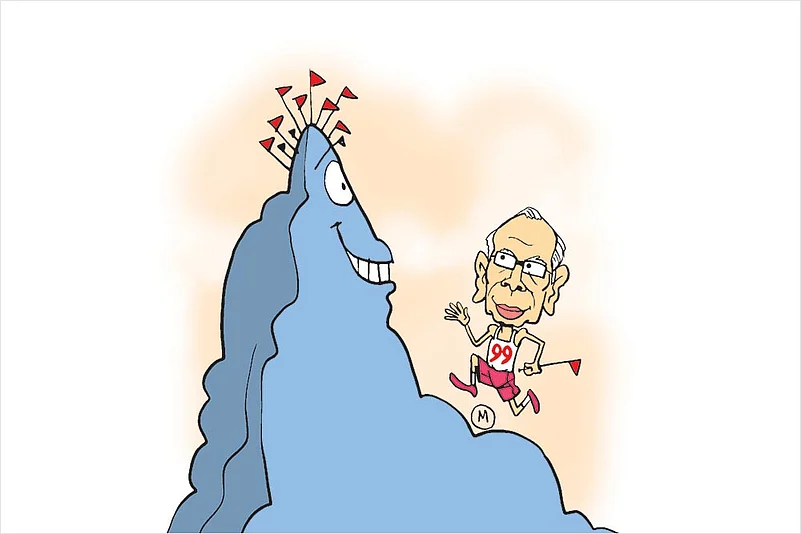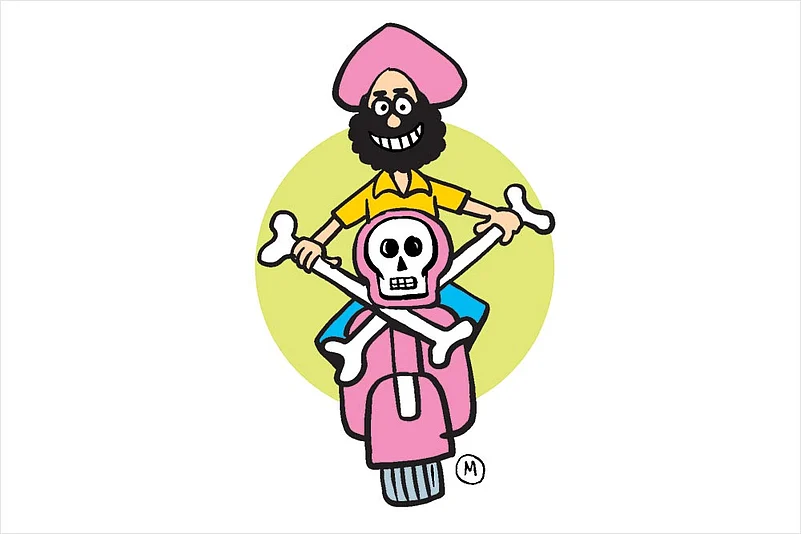Himalaya Dream, 99 And Counting
The Subcontinental Menu
From a 99-year-old's 29th expedition trip to the Himalayas to Leh's solution to deal with mountain of waste, read this and much more in The Subcontinental Menu.

Born an aristocrat; got baptised to Communism in college; turned spiritual after his young son’s death from a heart disease. Well, not all those who wander are lost. There are constants: like travelling all the way from balmy Kerala to the remote grandness of the Himalayas—not once, or twice, or a dozen times, but for a 29th expedition this winter. That’s award-winning educationist P. Chi--tran Namboodiripad, 99, from Thrissur, who can’t resist the call of the mountains, even at such an advanced age when most of his contemporaries would rather be quietly dozing in their snug armchairs. His lifelong adventure began in 1952 and he is driven by an ambition to go on a 30th Him--alayan trip. Drumrolls, please, for the indefatigable Chitran. But hark! The secret to his health is a strict and frugal vegetarian diet.

Pakistan’s Crowded Blackboards
If there’s one growth story Pakistan can boast of, it is its population spurt—207 million. The country sits on a demographic time bomb, gaining around four million people annually, and overburdening public services, from schools to hospitals. An example is the crammed tarp classrooms at the Tanjai Cheena school in the picturesque Swat valley in Khyber Pakhtunkhwa. It has two teachers, 140 students, four classrooms and no toilets. When nat-ure calls, the girls go to a teacher’s house. The boys rush to the bushes. In another school, in the town of Mingora, the youngest students sit in the courtyard, others gather on the roof. The school was damaged in an earthquake in 2005. And like most things in Pakistan, the repairs are pending.

The Old Leads The Young
Bangladesh is young. Its rulers are not. Most of the ministers and deputy ministers in the new 47-member cab-inet of prime minister Sheikh Hasina are over 60. The begum herself is over 70, as are her viziers overseeing finance and agriculture. Only two ministers are below 40, according to affidavits that each candidate submitted to the Election Commission before the December 30 polls. Deputy minister for education Mohibul Hassan Chowdhoury, who is 35, is the youngest, while minister for expatriates’ welfare and overseas employment, Imran Ahmed, is the oldest at 77. Premier Hasina, who heads the ruling Awami League, picked 31 new faces for her cabinet in her third consecutive term.

Debugged Wheels
Don’t let the bedbugs bite. That’s a long-winded way of saying sleep tight. But that’s one English phrase Karnataka’s public transporter—the KSRTC, which runs a fleet of around 870 buses kitted out with comfortable seats and smooth suspensions—couldn’t ever tell a passenger a decade ago. Its buses were infested with the blood-suckers and left most people with “ants in their pants”. And a formidable itch. As complaints mounted, the KSRTC unleashed a war on the bedbugs. A long fight to the finish. It contracted the Central Warehousing Corporation (CWC) to fumigate the buses. These are then covered with tarp for 24 hours to check the chemicals from dissipating in the air. The quarantined buses are cleaned and washed before they are redeployed. The debugging exercise is expensive, but the results are encouraging. The cost: over Rs 1 crore a year.

Insurance? What’s That?
There is anarchy on the roads in Punjab and Haryana, just like everywhere else. Heart-in-mouth traffic; chock-a-block streets. That’s par for the course. But the extra—like the thick malai in the lassi—is the people’s unanimous rejection of obligatory safety steps and insurance. Sounds far-fetched? Data shows almost 75 per cent of two-wheelers and about 20 per cent of four-wheelers in the two states are uninsured. And we thought motor insurance is mandatory. Well, all vehicles are insured at the time of purchase, but people seldom buy the renewal cover. Why? Because of laziness and lack of awareness, explains a private insurer.
The Mom-Pop Duty
To care for those who once cared for us is the biggest honour. It’s a timeless quote, repeated often by caregivers. But many tend to overlook that axiom. Bearing this in mind, Nepal proposes a law for children to compulsorily deposit five to 10 per cent of their income into their parents’ bank accounts to ensure their wellbeing in their old age. The step was decided following reports that even well-off people are neglecting their parents. The law will ensure financial security for the elderly. Offenders will be fined and the penalty amount will be credited in the parents’ accounts.
Leh Recycled And Upcycled
The rarefied air kept the flocks trickling in dribbles to the mystic valleys of Ladakh. Until 3 Idiots happened nine years ago on Christmas. Rancho’s photogenic home lured the selfie--cha-rged bip-eds in hordes to the outdoorsy, touristy eco-sensitive locales of Leh. They take home photos, memories, Tibbetti trinkets and leave behind a mountain of waste. Leh city produces an alarming 374 tonnes of waste each year. But much like the effervescent innovator, Leh--walas have a solution. Authorities put 65,000 kg of waste to productive use in 2018. Here’s the breakup: 27,000 kg sold to scrap dealers; 17,000 kg of car--d--board, egg trays and agriculture waste recycled; the rest is paper and cloth, upcycled into all manner of decorative doodah.

On Double Standards
The condition of the Uighurs, the Muslim minority in China’s far western province of Xinjiang, may be causing serious international concern. But China’s Muslim majority neighbour, Pakistan, would rather gloss over it.
Recipient of Chinese economic and diplomatic support during crises, Pakistan has decided not to join ranks with others in condemning Beijing’s action against Uighurs.
In a recent interview with a Turkish news channel, Pakistani Prime Minister Imran Khan said he doesn’t know much about the conditions of the Uighur Muslims. The persecution of the Uighurs have been widely reported in Western media. But Pakistan has turned a blind eye. Imran’s reaction came when he was asked whether Pakistan’s doing business with China restrains it from criticising Chinese action in Xinjiang.
Some weeks back the Pakistani foreign ministry had described critical reports about China’s role in Xinjiang as “sensationalised” by the foreign media. According to a UN panel estimate, over a million Uighur and Muslim minorities were held in detention centres in different parts of Xinjiang. Among them are dozens of women who married men from neighbouring Gilgit-Baltistan (G-B) region in Pakistan, where people regularly cross the border into China for trade.
But Pakistani foreign ministry spokesman Mohammad Faisal reportedly said last month, “Some faction of foreign media are trying to sensationalise the matter by spreading false information”. He added, “As per Chinese authorities, out of 44 women, six are in Pakistan. Four have been convicted of various charges, three are under investigation, eight are undergoing voluntary training. Twenty-three women are free and living in Xinjiang of their own free will.”
In recent years, Pakistan has heavily pushed its relationship with China, lauding the tens of billions of investment dollars that Beijing is pouring into the country as a “game-changer”.
Beijing has also upgraded the treacherous mountain road connecting Gilgit-Baltistan to Xinjiang.
Chinese authorities have often tried to justify their crackdown on Xinjiang’s Muslims to international counter-terrorism efforts, arguing that the “separatists” were bent on joining foreign extremist outfits like the Al-Qaeda.
Human rights activists claim the Uighur minority is being held for keeping long beards and wearing veil. But the billions of dollars that are pouring into Pakistan from China has for-ced Islamabad to remain silent, even as it remains over-sensitive to alleged rights violations in Jammu and Kashmir.
Illustrations by Manjul
- Previous Story
 Marital Rape 'A Social Issue Not Legal', Centre Files Affidavit With SC Against Criminalisation
Marital Rape 'A Social Issue Not Legal', Centre Files Affidavit With SC Against Criminalisation - Next Story
























